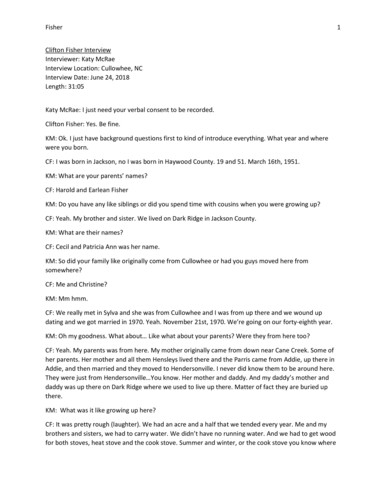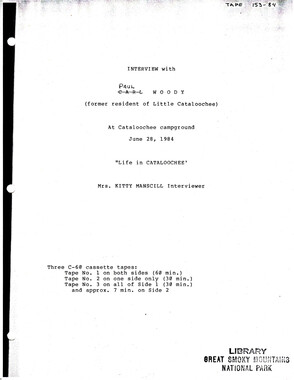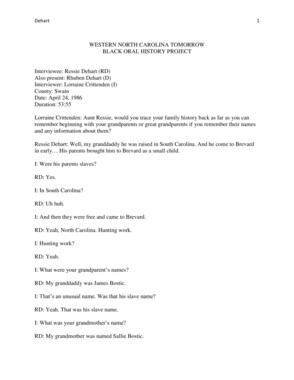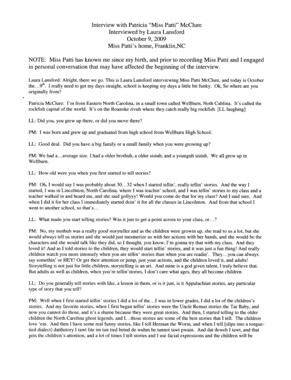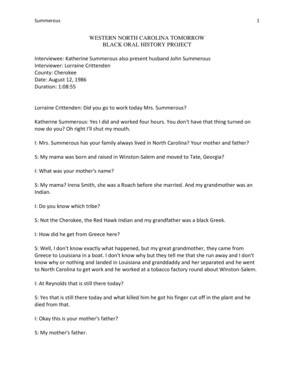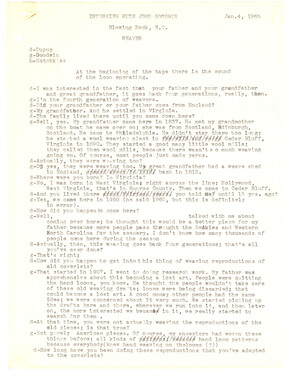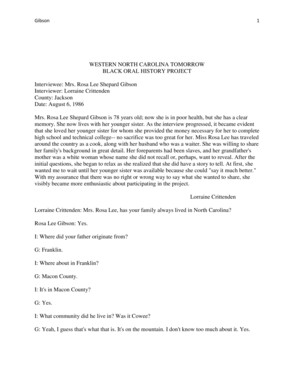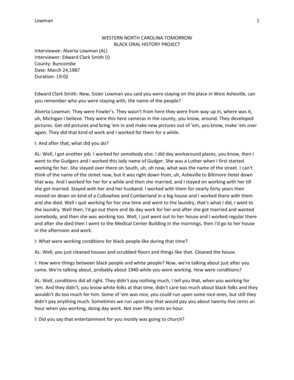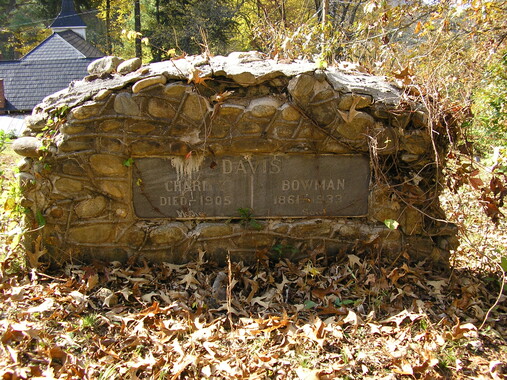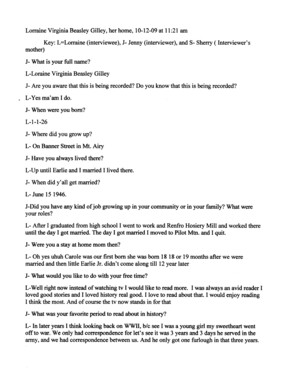Western Carolina University (20)
View all
- Canton Champion Fibre Company (2308)
- Cherokee Traditions (293)
- Civil War in Southern Appalachia (165)
- Craft Revival (1942)
- Great Smoky Mountains - A Park for America (2767)
- Highlights from Western Carolina University (430)
- Horace Kephart (941)
- Journeys Through Jackson (154)
- LGBTQIA+ Archive of Jackson County (26)
- Oral Histories of Western North Carolina (314)
- Picturing Appalachia (6772)
- Stories of Mountain Folk (413)
- Travel Western North Carolina (160)
- Western Carolina University Fine Art Museum Vitreograph Collection (129)
- Western Carolina University Herbarium (92)
- Western Carolina University: Making Memories (708)
- Western Carolina University Publications (2283)
- Western Carolina University Restricted Electronic Theses and Dissertations (146)
- Western North Carolina Regional Maps (71)
- World War II in Southern Appalachia (131)
University of North Carolina Asheville (6)
View all
- Allanstand Cottage Industries (62)
- Appalachian National Park Association (53)
- Bennett, Kelly, 1890-1974 (1388)
- Berry, Walter (76)
- Brasstown Carvers (40)
- Carver, George Washington, 1864?-1943 (26)
- Cathey, Joseph, 1803-1874 (1)
- Champion Fibre Company (233)
- Champion Paper and Fibre Company (297)
- Cherokee Indian Fair Association (16)
- Cherokee Language Program (22)
- Crowe, Amanda (40)
- Edmonston, Thomas Benton, 1842-1907 (7)
- Ensley, A. L. (Abraham Lincoln), 1865-1948 (275)
- Fromer, Irving Rhodes, 1913-1994 (70)
- George Butz (BFS 1907) (46)
- Goodrich, Frances Louisa (120)
- Grant, George Alexander, 1891-1964 (96)
- Heard, Marian Gladys (60)
- Kephart, Calvin, 1883-1969 (15)
- Kephart, Horace, 1862-1931 (313)
- Kephart, Laura, 1862-1954 (39)
- Laney, Gideon Thomas, 1889-1976 (439)
- Masa, George, 1881-1933 (61)
- McElhinney, William Julian, 1896-1953 (44)
- Niggli, Josephina, 1910-1983 (10)
- North Carolina Park Commission (105)
- Osborne, Kezia Stradley (9)
- Owens, Samuel Robert, 1918-1995 (11)
- Penland Weavers and Potters (36)
- Roberts, Vivienne (15)
- Roth, Albert, 1890-1974 (142)
- Schenck, Carl Alwin, 1868-1955 (1)
- Sherrill's Photography Studio (2565)
- Southern Highland Handicraft Guild (127)
- Southern Highlanders, Inc. (71)
- Stalcup, Jesse Bryson (46)
- Stearns, I. K. (213)
- Thompson, James Edward, 1880-1976 (226)
- United States. Indian Arts and Crafts Board (130)
- USFS (683)
- Vance, Zebulon Baird, 1830-1894 (1)
- Weaver, Zebulon, 1872-1948 (58)
- Western Carolina College (230)
- Western Carolina Teachers College (282)
- Western Carolina University (1794)
- Western Carolina University. Mountain Heritage Center (18)
- Whitman, Walt, 1819-1892 (10)
- Wilburn, Hiram Coleman, 1880-1967 (73)
- Williams, Isadora (3)
- Cain, Doreyl Ammons (0)
- Crittenden, Lorraine (0)
- Rhodes, Judy (0)
- Smith, Edward Clark (0)
- Appalachian Region, Southern (2399)
- Asheville (N.C.) (1917)
- Avery County (N.C.) (26)
- Blount County (Tenn.) (161)
- Buncombe County (N.C.) (1671)
- Cherokee County (N.C.) (283)
- Clay County (N.C.) (555)
- Graham County (N.C.) (233)
- Great Smoky Mountains National Park (N.C. and Tenn.) (510)
- Haywood County (N.C.) (3522)
- Henderson County (N.C.) (70)
- Jackson County (N.C.) (4692)
- Knox County (Tenn.) (25)
- Knoxville (Tenn.) (12)
- Lake Santeetlah (N.C.) (10)
- Macon County (N.C.) (420)
- Madison County (N.C.) (211)
- McDowell County (N.C.) (39)
- Mitchell County (N.C.) (132)
- Polk County (N.C.) (35)
- Qualla Boundary (981)
- Rutherford County (N.C.) (76)
- Swain County (N.C.) (2113)
- Transylvania County (N.C.) (247)
- Watauga County (N.C.) (12)
- Waynesville (N.C.) (73)
- Yancey County (N.C.) (72)
- Aerial Photographs (3)
- Aerial Views (60)
- Albums (books) (4)
- Articles (1)
- Artifacts (object Genre) (228)
- Bibliographies (1)
- Biography (general Genre) (2)
- Cards (information Artifacts) (38)
- Clippings (information Artifacts) (191)
- Crafts (art Genres) (622)
- Depictions (visual Works) (21)
- Design Drawings (1)
- Drawings (visual Works) (184)
- Envelopes (73)
- Facsimiles (reproductions) (1)
- Fiction (general Genre) (4)
- Financial Records (12)
- Fliers (printed Matter) (67)
- Glass Plate Negatives (381)
- Guidebooks (2)
- Internegatives (10)
- Interviews (812)
- Land Surveys (102)
- Letters (correspondence) (1013)
- Manuscripts (documents) (619)
- Maps (documents) (177)
- Memorandums (25)
- Minutes (administrative Records) (59)
- Negatives (photographs) (5835)
- Newsletters (1285)
- Newspapers (2)
- Occupation Currency (1)
- Paintings (visual Works) (1)
- Pen And Ink Drawings (1)
- Periodicals (193)
- Personal Narratives (10)
- Photographs (12976)
- Plans (maps) (1)
- Poetry (7)
- Portraits (1960)
- Postcards (329)
- Programs (documents) (151)
- Publications (documents) (2237)
- Questionnaires (65)
- Scrapbooks (282)
- Sheet Music (2)
- Slides (photographs) (402)
- Songs (musical Compositions) (2)
- Sound Recordings (796)
- Specimens (92)
- Speeches (documents) (15)
- Tintypes (photographs) (8)
- Transcripts (322)
- Video Recordings (physical Artifacts) (23)
- Vitreographs (129)
- Text Messages (0)
- A.L. Ensley Collection (275)
- Appalachian Industrial School Records (7)
- Appalachian National Park Association Records (336)
- Axley-Meroney Collection (2)
- Bayard Wootten Photograph Collection (20)
- Bethel Rural Community Organization Collection (7)
- Blumer Collection (5)
- C.W. Slagle Collection (20)
- Canton Area Historical Museum (2110)
- Carlos C. Campbell Collection (282)
- Cataloochee History Project (65)
- Cherokee Studies Collection (4)
- Daisy Dame Photograph Album (5)
- Daniel Boone VI Collection (1)
- Doris Ulmann Photograph Collection (112)
- Elizabeth H. Lasley Collection (1)
- Elizabeth Woolworth Szold Fleharty Collection (4)
- Frank Fry Collection (95)
- George Masa Collection (173)
- Gideon Laney Collection (452)
- Hazel Scarborough Collection (2)
- Hiram C. Wilburn Papers (28)
- Historic Photographs Collection (236)
- Horace Kephart Collection (861)
- Humbard Collection (33)
- Hunter and Weaver Families Collection (1)
- I. D. Blumenthal Collection (4)
- Isadora Williams Collection (4)
- Jesse Bryson Stalcup Collection (47)
- Jim Thompson Collection (224)
- John B. Battle Collection (7)
- John C. Campbell Folk School Records (80)
- John Parris Collection (6)
- Judaculla Rock project (2)
- Kelly Bennett Collection (1407)
- Love Family Papers (11)
- Major Wiley Parris Civil War Letters (3)
- Map Collection (12)
- McFee-Misemer Civil War Letters (34)
- Mountain Heritage Center Collection (4)
- Norburn - Robertson - Thomson Families Collection (44)
- Pauline Hood Collection (7)
- Pre-Guild Collection (2)
- Qualla Arts and Crafts Mutual Collection (12)
- R.A. Romanes Collection (681)
- Rosser H. Taylor Collection (1)
- Samuel Robert Owens Collection (94)
- Sara Madison Collection (144)
- Sherrill Studio Photo Collection (2558)
- Smoky Mountains Hiking Club Collection (616)
- Stories of Mountain Folk - Radio Programs (374)
- The Reporter, Western Carolina University (510)
- Venoy and Elizabeth Reed Collection (16)
- WCU Gender and Sexuality Oral History Project (32)
- WCU Mountain Heritage Center Oral Histories (25)
- WCU Oral History Collection - Mountain People, Mountain Lives (71)
- WCU Students Newspapers Collection (1744)
- Western North Carolina Tomorrow Black Oral History Project (69)
- William Williams Stringfield Collection (2)
- Zebulon Weaver Collection (109)
- African Americans (390)
- Appalachian Trail (35)
- Artisans (521)
- Cherokee art (84)
- Cherokee artists -- North Carolina (10)
- Cherokee language (21)
- Cherokee pottery (101)
- Cherokee women (208)
- Church buildings (167)
- Civilian Conservation Corps (U.S.) (110)
- College student newspapers and periodicals (1830)
- Dams (103)
- Dance (1023)
- Education (222)
- Floods (61)
- Folk music (1015)
- Forced removal, 1813-1903 (2)
- Forest conservation (220)
- Forests and forestry (1058)
- Gender nonconformity (4)
- Great Smoky Mountains National Park (N.C. and Tenn.) (181)
- Hunting (38)
- Landscape photography (10)
- Logging (103)
- Maps (84)
- Mines and mineral resources (8)
- North Carolina -- Maps (18)
- Paper industry (38)
- Postcards (255)
- Pottery (135)
- Railroad trains (71)
- Rural electrification -- North Carolina, Western (3)
- School integration -- Southern States (2)
- Segregation -- North Carolina, Western (5)
- Slavery (5)
- Sports (452)
- Storytelling (245)
- Waterfalls -- Great Smoky Mountains (N.C. and Tenn.) (66)
- Weaving -- Appalachian Region, Southern (280)
- Wood-carving -- Appalachian Region, Southern (328)
- World War, 1939-1945 (173)
Interview with Clifton Fisher
Item
Item’s are ‘child’ level descriptions to ‘parent’ objects, (e.g. one page of a whole book).
-
-
Fisher 1 Clifton Fisher Interview Interviewer: Katy McRae Interview Location: Cullowhee, NC Interview Date: June 24, 2018 Length: 31:05 Katy McRae: I just need your verbal consent to be recorded. Clifton Fisher: Yes. Be fine. KM: Ok. I just have background questions first to kind of introduce everything. What year and where were you born. CF: I was born in Jackson, no I was born in Haywood County. 19 and 51. March 16th, 1951. KM: What are your parents’ names? CF: Harold and Earlean Fisher KM: Do you have any like siblings or did you spend time with cousins when you were growing up? CF: Yeah. My brother and sister. We lived on Dark Ridge in Jackson County. KM: What are their names? CF: Cecil and Patricia Ann was her name. KM: So did your family like originally come from Cullowhee or had you guys moved here from somewhere? CF: Me and Christine? KM: Mm hmm. CF: We really met in Sylva and she was from Cullowhee and I was from up there and we wound up dating and we got married in 1970. Yeah. November 21st, 1970. We’re going on our forty-eighth year. KM: Oh my goodness. What about… Like what about your parents? Were they from here too? CF: Yeah. My parents was from here. My mother originally came from down near Cane Creek. Some of her parents. Her mother and all them Hensleys lived there and the Parris came from Addie, up there in Addie, and then married and they moved to Hendersonville. I never did know them to be around here. They were just from Hendersonville…You know. Her mother and daddy. And my daddy’s mother and daddy was up there on Dark Ridge where we used to live up there. Matter of fact they are buried up there. KM: What was it like growing up here? CF: It was pretty rough (laughter). We had an acre and a half that we tended every year. Me and my brothers and sisters, we had to carry water. We didn’t have no running water. And we had to get wood for both stoves, heat stove and the cook stove. Summer and winter, or the cook stove you know where Fisher 2 mama cooked. She cooked every morning. She got up about four o clock and she had to walk two miles to catch a ride to go to work and Daddy he went off logging you know. He’d have to leave pretty early too. KM: Where did your mom work? CF: She worked in mostly laundries you know. She worked in the, let’s see, over in Waynesville in laundry for quite a few years and then she worked at uh… KM: Is it the Sylva Laundromat or, I know what you’re talking about I just don’t remember the name of it. CF: Buster Brown. KM: Yeah. Yeah. CF: Buster Brown. She worked at Buster Brown there for quite a few years. KM: Do you have like a favorite memory when you were growing up? CF: I guess. Me and my brother and sister you know we had a lot of memories you know. We’d go to the woods and we had to pull some wood in on our backs. We get us a swing, a grapevine and we’d swing and play and all that stuff like that. Yeah. We had some, we had some good things. Good things growing up. KM: Did you, well I know you go to Speedwell Baptist Church now, but did you always go to church in this area? CF: No I went to Mt. Pleasant Baptist Church. I was saved at Mt. Pleasant Baptist Church up there and Christine went when we lived up there in Addie, when we got married, after we got married we lived there in a trailer and we went to Mt. Pleasant and then matter of fact after we moved up here we went for like a year or something and we started going to Speedwell Baptist. KM: Can you tell me about your involvement in Speedwell Baptist Church just like a little bit? CF: Well me and her went there you know we raised our kids up in it and then our grandkids they came along too and I became a deacon there, a deacon at the church. We’ve helped a lot of people and prayed for a lot of people. Done a lot of roles you know. KM: So now I have some questions about your high school days. (laughter) So I know you went to Sylva Webster High School. CF: Yes. KM: Did you, other than like going to school, did you still like help out your parents here or did you have a separate job that you went and worked for? CF: When I went to school? I worked at the Parkway Restaurant but I played football and wrestled the first two years. The third year, when I was in 11th grade, my brother and sister got married the same year, the same month, and my daddy hurt his back. He was down in his back so I quit school half of the Fisher 3 11th and I started helping her. I got a full time job and had to help her because we was renting. I had to pay the rent, help pay the rent. I was the only one, I was paying for a car too. They didn’t have a car. KM: So, where did you work during that time? CF: Well, I worked at the hospital for a while in the lab department washing valves. They had valves then. Ain’t like now. They had glass valves you had to wash them off. They took EKG’s you know. People they taught you on that and stuff and you had to clean the lab and then I left there and went to work at the sawmill. More money. And then I left there and, yeah I left there and I went to work at the furniture factory in Waynesville. I left there and then I went to work at the tannery in Haywood ’cause I was making $2.22 an hour. That was big money (laughter) back then. And then let’s see I missed one job in there. I worked in the hospital and construction. Yeah. That‘s when me and Christine was dating. We was dating then. KM: OK. So, now kind of going back to when you were still in high school. So you played on the football team and the wrestling team. I know that Sylva Webster won a state championship sometime around that, ere you on that team? CF: Yeah two of them. Well I was a freshman you know and a sophomore. Yeah we won the ‘65 and ‘66. Yeah we won them two years. We had a really, it was really exciting (laughter) winning the championship two years in a row. KM: I think that’s the last time we’ve won the football championship. CF: Let’s see. You’uns won in ‘74. Sylva Webster won in ‘74 I think it was. Jimmy Streeter and Steve Streeter was there at that time. KM: So, I know like sports are still an important part of your life today. Can you talk just a little, like I know you got to all of Taylor’s soccer games and basketball games. Just kind of all the sporting events we’ve had kind of since I can remember. Can you just like talk a little bit about what it means to you? Like why you go? CF: Well I love, I love sports anyway and we got into, you know I got my girls, helped coach them in Jackson County league when they were small when we got started. And then Tina she run some, you know, a little bit in high school, I mean, in grade school. And then we got into Hershey’s Track Meet. And then Jennifer got into it and so I got to taking them both to them track meets. And then I finally got them into Junior Olympics so I’d take them to Raleigh, you know, and let them run and it was exciting for them and me to you know. And then Jennifer her and Tina both played basketball, run track and they was really, they was really good at it really. See Tina got to go to State and Jennifer finished fifth in the state in the 300 meter hurdles so it… And then it carried over to the grandkids. I love the grandkids too and I helped them. But I just love sports especially when, you know, some of my peoples playing, grandkids or my kids, I like to support them and give them encouragement and stuff like that. KM: Do you think Lawson’s going to play sports too? Lawson and Madison? CF: Madison is a dancer. She likes to dance you know, but I think Lawson will. He’ll be there I’m sure. Yeah. He’s real athletic. Fisher 4 KM: Taylor always sends me pictures of him stomping around places or running around. So maybe… Maybe he’ll do something later. Then I have, some of these questions you’ve already answered about work but I know that you recently retired or a little bit ago from being a groundskeeper at WCU. CF: Yes. I was a supervisor over there. KM: When did you start working at WCU? CF: At where? KM: At Western? CF: Well, 1982. Before that I’d done construction all the time. I was a foreman for Avery Burton Company out of Lynchburg, VA and then I was an assistant superintendent for Blaylocks and Sons. Built that Cullowhee job there that road through there. And then I went to work for Western in 1982. January 1982, I worked for them thirty-two years and three months. Worked. Yeah. KM: So what kind of, like what kind of work did you do when you first got there? CF: I was mowing. Running a tractor. Pulling gang mowers and stuff like that and then about three years into it the foreman he retired and I applied for the job and I got the job and so I was foreman or supervisor for twenty-nine years. That’s all I done was supervise for twenty-nine years. Of course I worked on a side too. I ran a backhoe and tractors and everything. KM: So when… Was it three years after you started working then you became the grounds superintendent? CF: Yeah. KM: OK. So when like you kind of transitioned, not all the way but part way, from doing some of the labor work to like looking over everyone right? CF: Yeah. I had the trash, the trash truck and all that you know. I had thirteen, maybe thirteen employees and I had, we had students we hired too. Sometimes I’d have anywhere from two to six students you know during the summer time. They’d pull weeds and weed-eated and done stuff like that. KM: Yeah. So did you notice anything about how the work there changed from when you first got there from when you retired or was it mostly just the same things that were going on? CF: No, it changed a lot you know. Well, I changed a lot of it. I built a parking lot up at Camp Lab, two of them. Built one over at the picnic area. Built one over at the water plant. You know, we done stuff like that when I was there and they wasn’t that way when I first went there and then I had that construction experience so they got to use my experience to put in pipes and you know build all this other stuff. KM: So you kind of broadened the work that you guys did. CF: Yeah. Kept moving on. Yeah. And we done a lot of planting too. You know. Planting shrubbery and all that stuff, but I had all the equipment. I had the landfill too over at Western you know, way back. And we had to cover it each day and had a back hoe, tractors, dump trucks. I was over all of them. (Laughter) Fisher 5 KM: So while you were working at Western did you notice, anything changed like about the school itself? Like did you notice were there very many changes do you think from each Chancellor or? CF: Yeah I was there over… When I first went there, Chancellor Robinson was there and then he retired and they had, I forget what the guy’s name was, took his place for a little while till they got… can’t think of the other one’s names. And then Bardo came and then this last Chancellor and all. Yeah. They changed a lot. Bardo changed, he done a lot of building and got a lot of money for that. There was a lot of changes made then. When I first went there the Ramsey Center wasn’t even there and I helped build the road around the Administration Building down there. I helped build a road around it when I was on construction. And so he just started and I think, they built… let’s see they built Blue Ridge and Balsam, tore Helder and all them down you know and they built. Let’s see, the bookstore was built when I was there. The science building was built. I’ve seen a lot of it. (laughter) KM: That’s a lot. Yeah. CF: And Central up there they built it. I helped on it, too. KM: So, when I was researching you earlier, I found that you had won an award for like your work as a grounds superintendent. Can you kind of just describe what that award was, for me? CF: Yes. It was the Judy Dowell Award. Let me get it and I’ll show it to you. (laughter) KM: That’s impressive. So that was in 2006 and 7. CF: Mm hmm. I also got a thousand dollars with it. That’s what made it so sweet (laughter). KM: That’s even better. CF: But they pick one employee out of and I just happened to be the one that get it. Of course, Roger Turk) now, superintendent over me, you know, I was supervisor underneath him and he wrote all this stuff up. You know, they took mine and I won it. They have a committee that chooses who they’re gonna get. So, I guess I got lucky. (laughter) KM: So that was… you retired three years ago? CF: Four years. KM: Four years? CF: Four years in April. First. My birthday was on March the 16 so I waited till April to retire. Sixty-six… no. Gosh. No way back there wasn’t it, sixty-three. Yeah. KM: OK. So, the next questions are kind of just like about Jackson County in general. So, have you seen… like if you could pick like a positive change that you’ve seen in Jackson County over the years, what do you think it would be? CF: I guess the positivist change is that Westerns got bigger when they built a nice road into it. When they built the four lane to it, opened it up for Western North Carolina here and Jackson County you know. And I guess the hospital has growed too, over the years from what it was. Used to be a community hospital. It used to be small but its enlarged a lot. I don’t know whether the politics have Fisher 6 gotten any better or not. (laughter) I don’t know about that, now. But there have been quite a few changes, you know. Some for the good. Some for the bad like everywhere I guess. KM: Mm hmm. So what are some of the negative change, or like, negative changes that you think? If you can think of any? CF: In Jackson County? KM: Mm hmm. CF: Hmmm. I couldn’t think of one right now. KM: Do you think that other than like, not that it stayed the same, but because obviously now we have Western and the hospital, there’s more people coming in and out… CF: Yeah. Mm hmm. KM: But do you think other than that, that it has… it’s kind of stayed the same? CF: I don’t know. There have been a lot of people, you know, came in from different parts of the country and everything. It changed the culture of the mountain people you know. It brought in people from South and the North. You know, it changed a whole lot of what the mountain people done because a lot of them people thought that mountain people was poor, and sort of hicks. They always had that, you know, but it’s changed a lot of the cultures by integrating all the people together you know. And all of that stuff. KM: What kind of influence do you think growing up in this particular spot in North Carolina had on you? CF: Well, there’s people ask me, you know, “Why don’t you go somewhere else?” you know. But I always loved it here so why go anywhere else when you gonna stay you know. So, I just, I worked here and got married here and had my family here and my grandkids has all growed up here. It’s just been a good life for me really. Me and my wife and kids and all that. I just loved it here. The things I’ve knew how to do too. Pick blackberries and everything else. We picked blackberries, you know, and sold them and dug ginseng. KM: Yeah. My dad digs it in our backyard sometimes and tries to sell it. CF: We do a lot of ginseng me and my brother and sister you know. She dug along with us. We done a crop every summer. Big garden and all that stuff. Mama canned all the corn and beans. KM: Do you still keep a garden? CF: Yeah. I got one now. Yeah me and Christine. Christine still cans too and we’ve got a freezer you know. Yeah she still does a lot of stuff, you know, her and her mother used to. They do a lot. She still does a lot, you know cut off the corn. KM: My mom, she’s trying to grow corn but she doesn’t have enough room in her garden. So, we just get it from our grandpa. Every summer we have to cut off the cob and can it but its good I like it. CF: Yeah its good. That canned corn is. Fisher 7 KM: Do you have, so I’m all finished with my questions but, do you have like any just stories you want to tell me? Like maybe about, I don’t remember if it was Tina or Jennifer in the basketball game. CF: Oh. (laughter) Yeah. I used to have a saying you know. I called Jennifer “peanut” because she was small when she was growing up. Real slim, little and I called her “peanut.” Well when she got in high school she growed like six inches in one season in like six or eight months she growed like six inches. And I’d holler at the basketball games at the referees and stuff and I’d holler at her at “peanut” and she never would look. She’d keep her head, she never would look up and they asked her, “Who is he’s talking about?” “I don’t know.” She never would recognize, you know, that I was calling her and I’d say it without thinking you know. But and then Tina, I took them to the state games one time, both of them. And Tina won, I think it was two silvers and a bronze. Jennifer won four gold medals and we took pictures of them. We took all of them on Tina and took pictures and then we put all of them on Jennifer and took pictures you know and me and Christine we had, we all had fun that day. And we went from there to South Carolina. My sister had a lake front down there. We went down there and stayed a weekend after that. Had a lot of fun. I had a lot of fun with the kids. That’s one of the reason I got out of construction and went to work for Western. I wanted to spend time with the young’uns because I was getting up like four o’ clock in the morning and I was gone like till nine o’clock at night. They was in bed when I left. They was in bed when I got back. You know, because Christine put them in the bed. All I got to see them was a little bit on Saturday and Sunday and back at it again. (laughter) But it’s been a good life. I’ve had a good time. And I enjoyed, you know, working with your mother and you’uns girls down there. Taylor. I get her and Jennifer mixed up all the time. KM: They look similar. The first time I saw Jennifer I said, “Well, I can tell where Taylor gets it from.” CF: Yeah. I guess that’s all I got to tell you. I mean Christine and I had it a little rough, you know, after we got married there. We was both working. And we had our first kid which didn’t survive and then Tina come and Jennifer but we’ve been together the good time and the bad times. (Laughter) Rough times. KM: Forty-eight years. CF: November it will be forty-eight years. That’s a long time. Anything else? KM: Just if you can think of anything else to tell me… CF: I don’t know. We moved up here, Tina was three months old. I pushed this place out with the dozer on Christmas Eve. I was pushing on it on Christmas Eve because I got the dozer off the company and they shut down for Christmas you know and I got them moved over here where I could push it out. And I pushed it out on Christmas Eve. We’ve got pictures you know. That has been forty-three years ago when we moved up here. And see this part over here is the trailer. This part I built all the way through. I got a bathroom, the bedroom, living room, dining room and another bedroom. I built all that. KM: That’s a lot. CF: Yeah. We just built on it as we could but it’s here. (laughter) I made another $1,000 to pay the doctor bill (laughter). [I just got on insurance]. OK. Got anything? KM: I don’t think so. CF: OK. I appreciate it. Fisher 8 KM: Oh! I appreciate it. CF: You’re welcome.
Object
Object’s are ‘parent’ level descriptions to ‘children’ items, (e.g. a book with pages).
-
Clifton Fisher is interviewed by a Smoky Mountain High School student as a part of Mountain People, Mountain Lives: A Student Led Oral History Project. Born in 1951, Fisher grew up in Jackson County. He talks about his childhood including playing football for Sylva-Webster High School and winning the state championship in 1965 and 1966. Fisher, who worked for Western Carolina University for 32 years and retired as grounds supervisor in 2014 shares the changes he’s seen at both the university and Jackson County.
-
